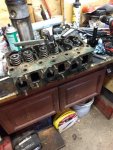Oerthedge21
Member
- 250
- 20
- 18
- Location
- Northford CT
Steel Soldiers now has a few new forums, read more about it at: New Munitions Forums!

Okay, Please help a brother out here... I see what looks like some rather light rotational scoring, a bit of pitting, and what appears to be a few tiny gougies, but it appears the majority of the bearing surface hasn't seen much wear due to the perpendicular lines still being readily visible, and rather unbroken/uninterrupted across the width of the bearing. I'd imagine those perpendicular lines are there from the manufacturing process rather than use, and look to have very little depth. Given the relative softness of the bearing surface in relation to the crankshaft, that stuff doesn't look too terribly bad to my bleary eyes. So my question is, is it usually common pratice to replace rod bearings with any discernible scoring or pitting, no matter how shallow/sparse? Or are you just replacing them since you're already in there and have access to them?I found a NOS piston liner combo on eBay for 95$ so I just ordered the pair, better deal than trying to buy separately. Plus the lower rod bearing looks like it's been beat up, so I'm just gonna buy a full set of those too instead of just doing one. View attachment 774565View attachment 774566
OK, Nemesis has a valid point here. The proper way to check the bearings is with "plasti-gauge" . You install a thin strip on the bearing, (which is still installed in the rod) then reinstall it on the crank. Then after torqueing the rod to spec you remove it (being sure not to move it !) and using the chart supplied you can tell the clearance. After checking the crank journal with a micrometer you then can tell if the bearing is bad. Yes it is a bit of a process, so most mechanics just slap in a new set of bearings and call it good.Okay, Please help a brother out here... I see what looks like some rather light rotational scoring, a bit of pitting, and what appears to be a few tiny gougies, but it appears the majority of the bearing surface hasn't seen much wear due to the perpendicular lines still being readily visible, and rather unbroken/uninterrupted across the width of the bearing. I'd imagine those perpendicular lines are there from the manufacturing process rather than use, and look to have very little depth. Given the relative softness of the bearing surface in relation to the crankshaft, that stuff doesn't look too terribly bad to my bleary eyes. So my question is, is it usually common pratice to replace rod bearings with any discernible scoring or pitting, no matter how shallow/sparse? Or are you just replacing them since you're already in there and have access to them?
It is needed - for peace of mind, at least...Nowadays bearings are so much better than from the 70's, I doubt its really needed to check new bearing clearances.
Actually for more then piece of mind. My good buddy who is also a Master Mechanic had the machine shop turn a crank and supply a set of rod and crank bearings with it. He didn't check the clearances and after installing and running the engine sent it out. It came back blowing smoke and sounding like a thrashing machine ! The machine shop had supplied the wrong bearings ! He thought it was a little tight, but after all the machine shop should know what their doing right ?It is needed - for peace of mind, at least...

Sounds good. Did you take a straight edge to the heads ? I've found several that needed machining due to warping. I believe the cause was loose head studs and the high compression of the Multifuel. I plan on installing "ARP" studs when I rebuild my engine.Got the rear head off yesterday, pulled he valves out of the front one, wetsanded and polished them all, had some nasty buildup on the intakes. In the process of doing the same to the rear head now. Thankfully neither head is cracked or warped as far as I can tell, and all of the valves are pretty decent, no bad pitting or scoring. View attachment 775046

